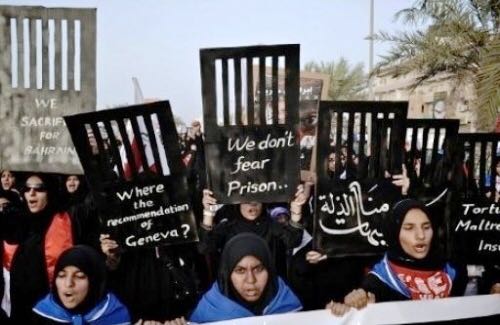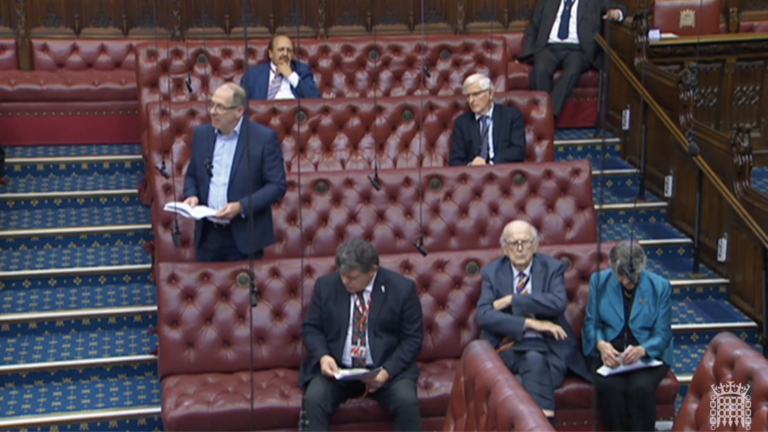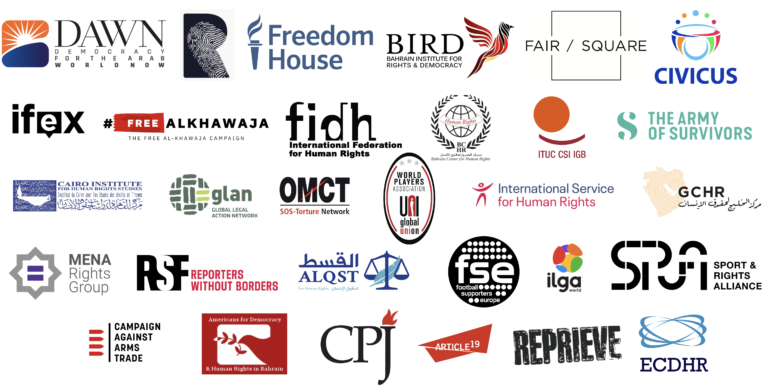8 June 2018 – Female activist Zakeya Isa Ali Isa Albarboori, 31, and her niece, student Fatema Dawood Hasan Ahmed Juma, 19, were both charged by the Public Prosecution on 6 June for their alleged involvement in terrorist activities, following their arbitrary arrest and a two-week enforced disappearance. Their family has not yet been allowed to visit the two women.
BIRD strongly condemns their arbitrary arrests and enforced disappearance, which is strictly prohibited by international law and not permitted in any circumstances, as well as the apathy demonstrated by UK-trained Ombudsman and the National Institute for Human Rights (NIHR) for failing to address and investigate the case.
The Arbitrary Arrest:
Fatema, a student at the University of Bahrain, and her aunt Zakeya were both arrested on 17 May 2018 at approximately 3am. Their house was surrounded by around ten armored vehicles and approximately thirty officers, who entered the house without a warrant. The two women were then subjected to enforced disappearance and incommunicado detention from 21 May to 6 June, without access to legal representation.
Following their arrest, at around 5.50am, both Zakeya and Fatema called their families to inform them that they were at the Criminal Investigation Directorate (CID). Later during the day, Fatema’s father and Zakeya’s brother went to the CID, however, they were not allowed to enter the building, and were threatened with arrest if they did not leave.
On that same day, at 10:51 pm, Zakeya and Fatema called again their family and each requested that clothes be sent to them. About an hour later, their family followed up on their request and brought their clothes to the CID.
On 21 May at 11.34 pm, Fatema and Zakeya made a third phone call in which they reiterated their request of fresh clothes, and stated they were held at the CID. On the following day, their family went to the CID first, and subsequently to Isa Town Women’s Detention Centre to hand over the clothes. At the beginning, however, both institutions refused to take the clothes stating the two women were not being held on the premises. Two days later, the family followed up with Isa Town Detention Centre. Prison authorities stated that they would accept the clothes but could not assure that would give them to Zakeya and Fatema as they could not confirm the two women were being held there.
The Incommunicado Detention:
BIRD has been in contact with their family, who confirmed that after the last phone call which took place on 21 May, no further contact was made between the women and their family, nor had the family been informed by any officials of the whereabouts of the two detainees.
On 6 June, both women were transferred to the office of the Public Prosecutor, and Fatema was interrogated from approximately 10:30pm to 3:30am. Fatema’s lawyer received a call to attend the interview with the Public Prosecution and was present during the interrogation. Zakeya, instead, did not have access to legal representation, which is a breach of her rights.
The right to legal representation is a fundamental safeguard against torture and other ill-treatment, and is established under international human rights law as one of the key norms for a fair trial.
There is a great concern for Zakeya and Fatema’s safety, given the risk that they could be being subjected to harsh interrogations, involving physical and psychological torture and ill-treatment.
Commenting, BIRD’s Director of Advocacy, Sayed Ahmed Alwadaei said: “Zakeya and Fatema’s enforced disappearance is a breach of international law. Three short phone calls is all what their family heard from the two women, as they have not yet been allowed to see them. It appears they were subjected to long and exhausting interrogations.”
He added “The two women are victims of a flawed system which is designed to wrongfully convict political dissidents by labelling them as a threat to the country.”
Background Information:
At the time of the arrest on 17 May, around ten masked police officers dressed in plain clothes were accompanied by smaller groups of officers in uniform (commandos). No warrant was presented when officers conducted the raid, during which they confiscated belongings, including Fatema’s mobile phone and laptop and Zakeya’s car. Zakeya and Fatema were taken to the Criminal Investigation Directorate (CID).
On 18 May, the police conducted a second raid at 4am without a warrant, during which they terrorised the entire family. The officers entered a room where three members of the family were sleeping, including ten-year-old Hussein who was awakened with a slap and ordered to leave the room. Another member of the family, 26-year-old Abdulla, who suffers from a pre-existing medical condition was aggressively kicked out and beaten on the chest.
Officers also entered the room of Zakeya’s mother, Khadeja, and treated her harshly so that she had to sit on the floor to regain her balance. After the police left, the family called for an ambulance to attend both Abdulla and Khadeja.
Failures of the Authorities:
Multiple attempts have been made by the family to gain clarification on the location of Zakeya and Fatema. On 20 May, the family approached the Ministry of Interior Ombudsman and the National Institute for Human Rights (NIHR) to request family visitation, discuss the arbitrary nature of the raid and arrest, and raise the issue of the lack of access to legal representation. Furthermore, they appealed for a phone call to find out the condition of the women.
However, no action was taken by either of the two bodies until 24 May, when the Ombudsman told Fatema’s father that he could arrange for visitation and he should request it from the CID. On Sunday 27 May, Fatema’s father went to Isa Town Prison, the CID and the Public Prosecution office, all of whom claimed they did not have the jurisdiction to arrange for such visitation.
On 31 May, a family member who prefers not to be named, called the Ombudsman, who informed them that there was nothing more they could do. The Ombudsman also falsely claimed that they had informed Zakeya and Fatema’s lawyers about their location. The family member also called the NIHR, who stated that the case was still under consideration despite over a week elapsing since the submission of the complaint.





